Marketing in Travel and Tourism: A Strategic Analysis and Plan
VerifiedAdded on 2019/12/03
|18
|6421
|146
Report
AI Summary
This report delves into the core concepts of marketing within the travel and tourism sector, examining how marketing activities drive customer interest and business success. It explores the importance of marketing in promoting services and attracting customers, with a focus on Thomas Cook as a case study. The report covers essential topics such as market segmentation, consumer motivation, and the impact of the marketing environment (analyzed via PESTLE). It also investigates factors influencing consumer demand, the role of strategic marketing planning, and the importance of the marketing mix (product, price, place, and promotion). The report further analyzes the influence of marketing on society and the integrated nature of the promotional mix, concluding with a plan for an integrated promotional campaign for Thomas Cook. Overall, the report provides a comprehensive overview of marketing strategies and their application within the dynamic travel and tourism industry.
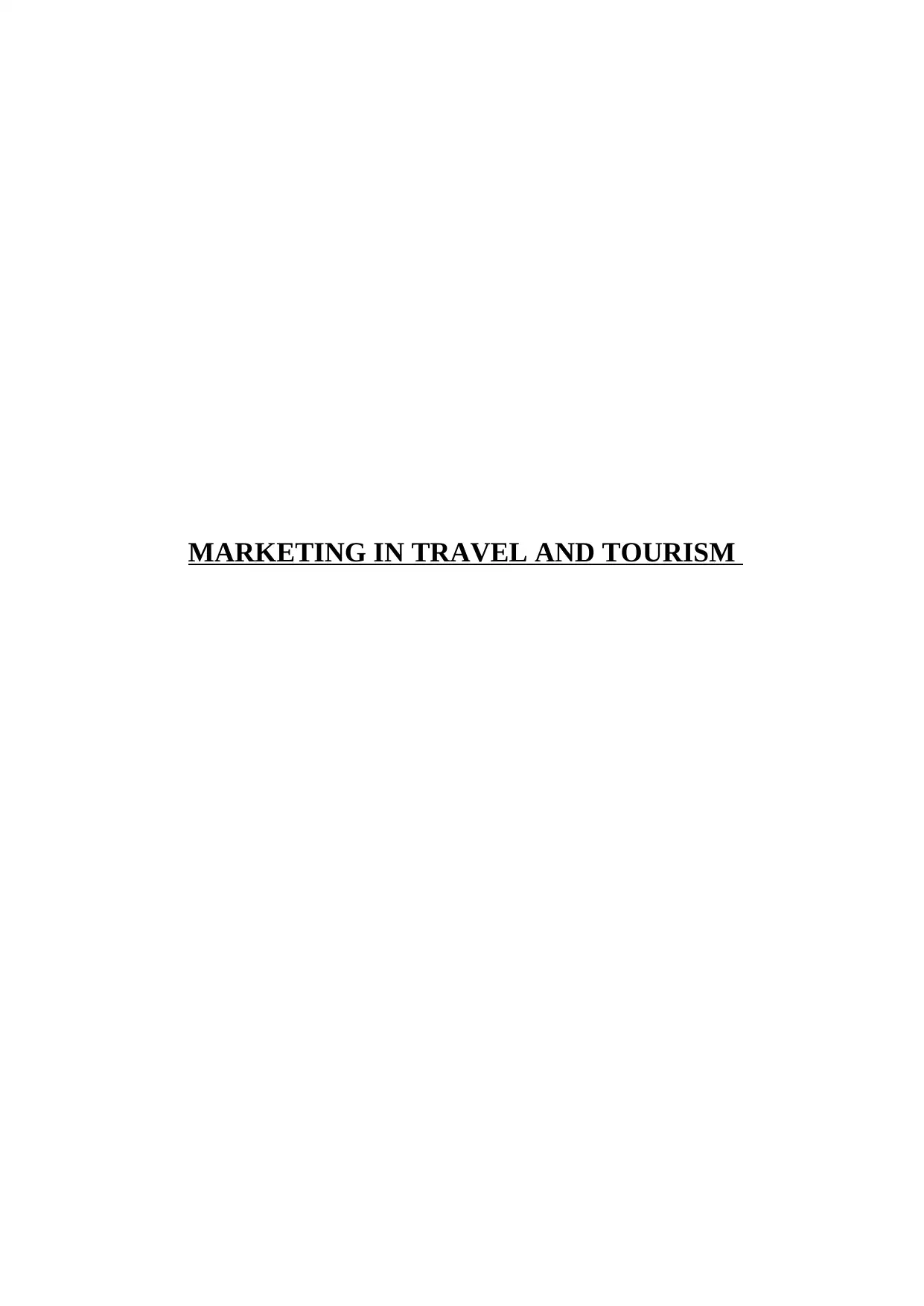
MARKETING IN TRAVEL AND TOURISM
Paraphrase This Document
Need a fresh take? Get an instant paraphrase of this document with our AI Paraphraser
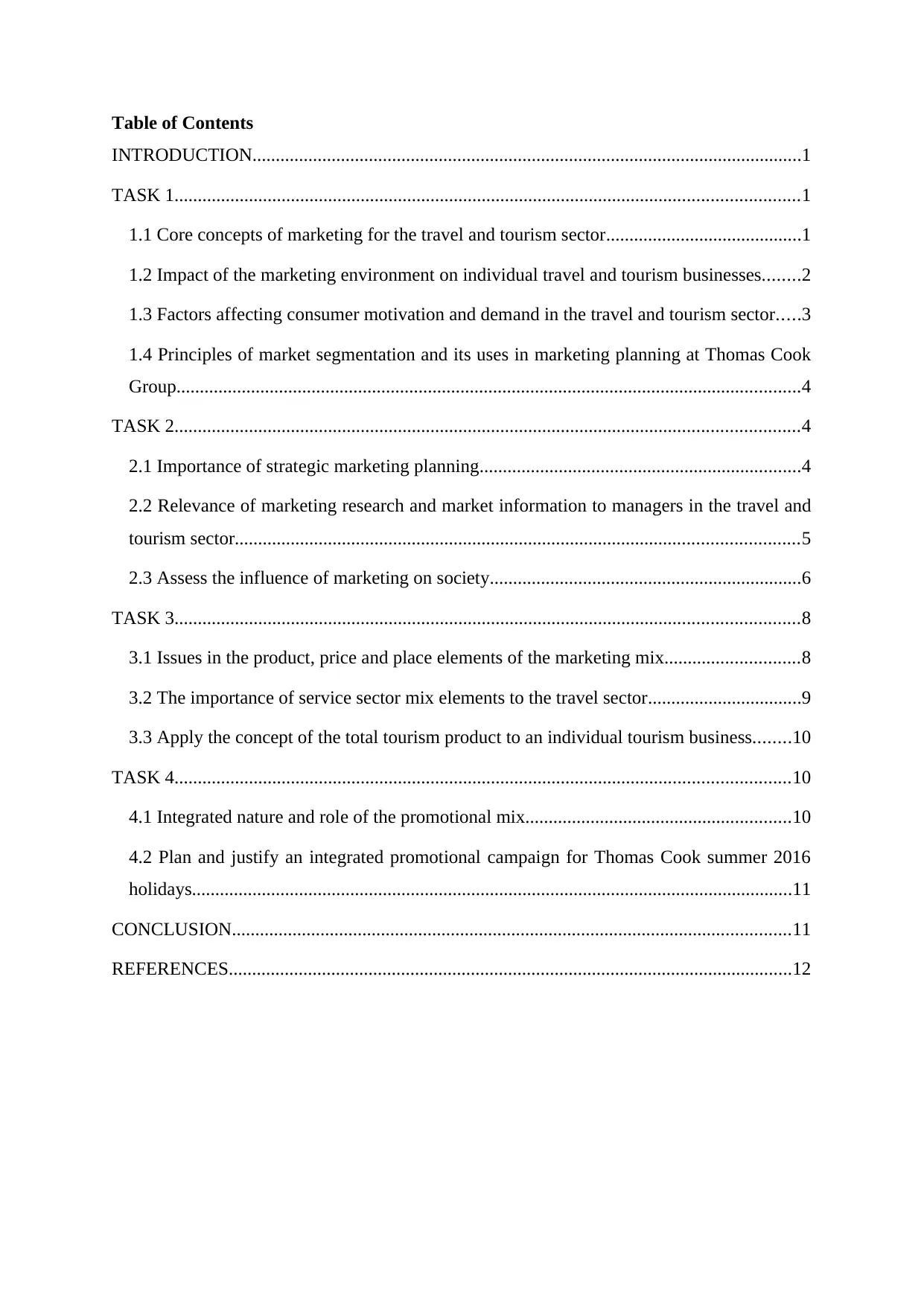
Table of Contents
INTRODUCTION......................................................................................................................1
TASK 1......................................................................................................................................1
1.1 Core concepts of marketing for the travel and tourism sector..........................................1
1.2 Impact of the marketing environment on individual travel and tourism businesses........2
1.3 Factors affecting consumer motivation and demand in the travel and tourism sector.....3
1.4 Principles of market segmentation and its uses in marketing planning at Thomas Cook
Group......................................................................................................................................4
TASK 2......................................................................................................................................4
2.1 Importance of strategic marketing planning.....................................................................4
2.2 Relevance of marketing research and market information to managers in the travel and
tourism sector.........................................................................................................................5
2.3 Assess the influence of marketing on society...................................................................6
TASK 3......................................................................................................................................8
3.1 Issues in the product, price and place elements of the marketing mix.............................8
3.2 The importance of service sector mix elements to the travel sector.................................9
3.3 Apply the concept of the total tourism product to an individual tourism business........10
TASK 4....................................................................................................................................10
4.1 Integrated nature and role of the promotional mix.........................................................10
4.2 Plan and justify an integrated promotional campaign for Thomas Cook summer 2016
holidays.................................................................................................................................11
CONCLUSION........................................................................................................................11
REFERENCES.........................................................................................................................12
INTRODUCTION......................................................................................................................1
TASK 1......................................................................................................................................1
1.1 Core concepts of marketing for the travel and tourism sector..........................................1
1.2 Impact of the marketing environment on individual travel and tourism businesses........2
1.3 Factors affecting consumer motivation and demand in the travel and tourism sector.....3
1.4 Principles of market segmentation and its uses in marketing planning at Thomas Cook
Group......................................................................................................................................4
TASK 2......................................................................................................................................4
2.1 Importance of strategic marketing planning.....................................................................4
2.2 Relevance of marketing research and market information to managers in the travel and
tourism sector.........................................................................................................................5
2.3 Assess the influence of marketing on society...................................................................6
TASK 3......................................................................................................................................8
3.1 Issues in the product, price and place elements of the marketing mix.............................8
3.2 The importance of service sector mix elements to the travel sector.................................9
3.3 Apply the concept of the total tourism product to an individual tourism business........10
TASK 4....................................................................................................................................10
4.1 Integrated nature and role of the promotional mix.........................................................10
4.2 Plan and justify an integrated promotional campaign for Thomas Cook summer 2016
holidays.................................................................................................................................11
CONCLUSION........................................................................................................................11
REFERENCES.........................................................................................................................12
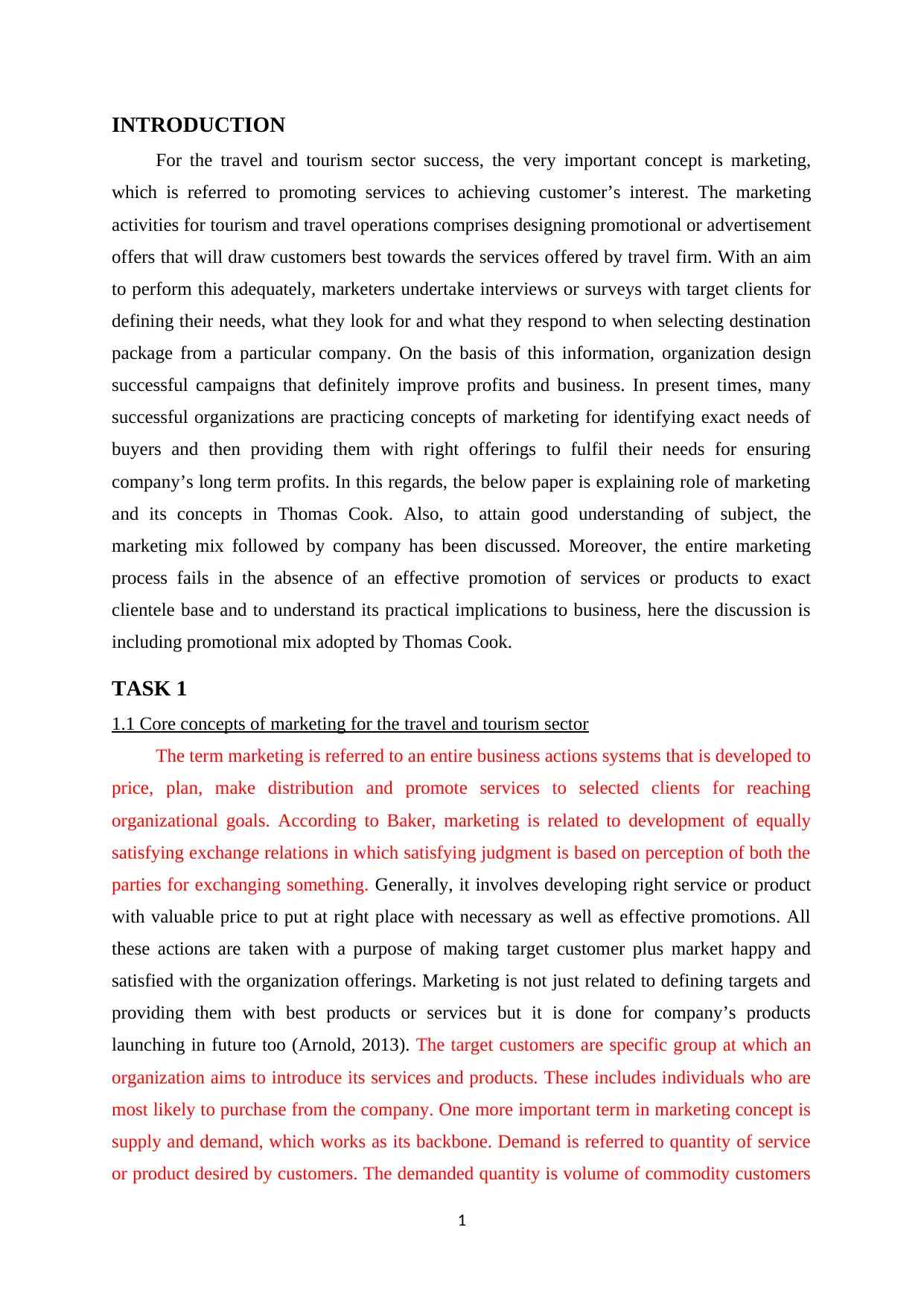
INTRODUCTION
For the travel and tourism sector success, the very important concept is marketing,
which is referred to promoting services to achieving customer’s interest. The marketing
activities for tourism and travel operations comprises designing promotional or advertisement
offers that will draw customers best towards the services offered by travel firm. With an aim
to perform this adequately, marketers undertake interviews or surveys with target clients for
defining their needs, what they look for and what they respond to when selecting destination
package from a particular company. On the basis of this information, organization design
successful campaigns that definitely improve profits and business. In present times, many
successful organizations are practicing concepts of marketing for identifying exact needs of
buyers and then providing them with right offerings to fulfil their needs for ensuring
company’s long term profits. In this regards, the below paper is explaining role of marketing
and its concepts in Thomas Cook. Also, to attain good understanding of subject, the
marketing mix followed by company has been discussed. Moreover, the entire marketing
process fails in the absence of an effective promotion of services or products to exact
clientele base and to understand its practical implications to business, here the discussion is
including promotional mix adopted by Thomas Cook.
TASK 1
1.1 Core concepts of marketing for the travel and tourism sector
The term marketing is referred to an entire business actions systems that is developed to
price, plan, make distribution and promote services to selected clients for reaching
organizational goals. According to Baker, marketing is related to development of equally
satisfying exchange relations in which satisfying judgment is based on perception of both the
parties for exchanging something. Generally, it involves developing right service or product
with valuable price to put at right place with necessary as well as effective promotions. All
these actions are taken with a purpose of making target customer plus market happy and
satisfied with the organization offerings. Marketing is not just related to defining targets and
providing them with best products or services but it is done for company’s products
launching in future too (Arnold, 2013). The target customers are specific group at which an
organization aims to introduce its services and products. These includes individuals who are
most likely to purchase from the company. One more important term in marketing concept is
supply and demand, which works as its backbone. Demand is referred to quantity of service
or product desired by customers. The demanded quantity is volume of commodity customers
1
For the travel and tourism sector success, the very important concept is marketing,
which is referred to promoting services to achieving customer’s interest. The marketing
activities for tourism and travel operations comprises designing promotional or advertisement
offers that will draw customers best towards the services offered by travel firm. With an aim
to perform this adequately, marketers undertake interviews or surveys with target clients for
defining their needs, what they look for and what they respond to when selecting destination
package from a particular company. On the basis of this information, organization design
successful campaigns that definitely improve profits and business. In present times, many
successful organizations are practicing concepts of marketing for identifying exact needs of
buyers and then providing them with right offerings to fulfil their needs for ensuring
company’s long term profits. In this regards, the below paper is explaining role of marketing
and its concepts in Thomas Cook. Also, to attain good understanding of subject, the
marketing mix followed by company has been discussed. Moreover, the entire marketing
process fails in the absence of an effective promotion of services or products to exact
clientele base and to understand its practical implications to business, here the discussion is
including promotional mix adopted by Thomas Cook.
TASK 1
1.1 Core concepts of marketing for the travel and tourism sector
The term marketing is referred to an entire business actions systems that is developed to
price, plan, make distribution and promote services to selected clients for reaching
organizational goals. According to Baker, marketing is related to development of equally
satisfying exchange relations in which satisfying judgment is based on perception of both the
parties for exchanging something. Generally, it involves developing right service or product
with valuable price to put at right place with necessary as well as effective promotions. All
these actions are taken with a purpose of making target customer plus market happy and
satisfied with the organization offerings. Marketing is not just related to defining targets and
providing them with best products or services but it is done for company’s products
launching in future too (Arnold, 2013). The target customers are specific group at which an
organization aims to introduce its services and products. These includes individuals who are
most likely to purchase from the company. One more important term in marketing concept is
supply and demand, which works as its backbone. Demand is referred to quantity of service
or product desired by customers. The demanded quantity is volume of commodity customers
1
⊘ This is a preview!⊘
Do you want full access?
Subscribe today to unlock all pages.

Trusted by 1+ million students worldwide
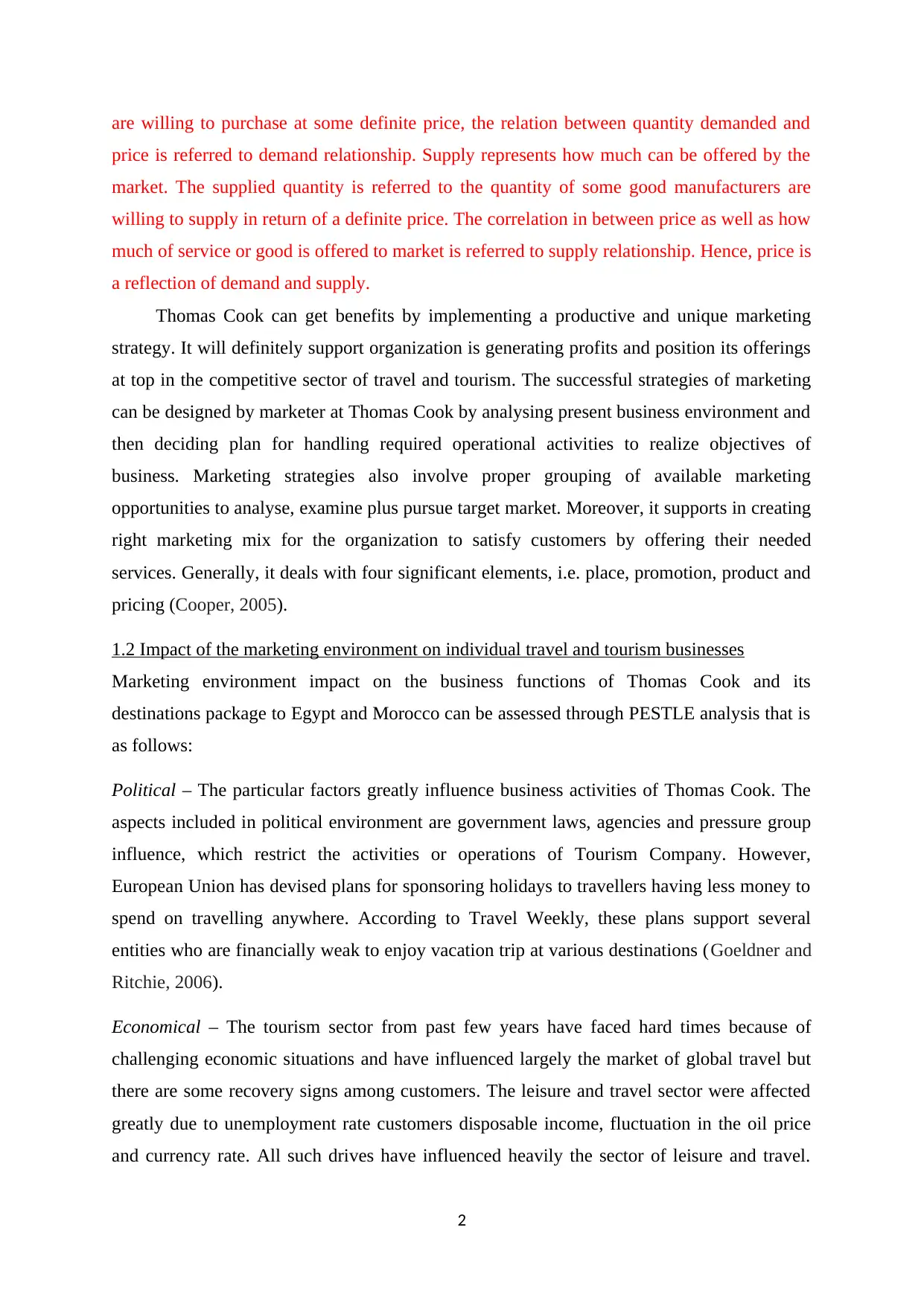
are willing to purchase at some definite price, the relation between quantity demanded and
price is referred to demand relationship. Supply represents how much can be offered by the
market. The supplied quantity is referred to the quantity of some good manufacturers are
willing to supply in return of a definite price. The correlation in between price as well as how
much of service or good is offered to market is referred to supply relationship. Hence, price is
a reflection of demand and supply.
Thomas Cook can get benefits by implementing a productive and unique marketing
strategy. It will definitely support organization is generating profits and position its offerings
at top in the competitive sector of travel and tourism. The successful strategies of marketing
can be designed by marketer at Thomas Cook by analysing present business environment and
then deciding plan for handling required operational activities to realize objectives of
business. Marketing strategies also involve proper grouping of available marketing
opportunities to analyse, examine plus pursue target market. Moreover, it supports in creating
right marketing mix for the organization to satisfy customers by offering their needed
services. Generally, it deals with four significant elements, i.e. place, promotion, product and
pricing (Cooper, 2005).
1.2 Impact of the marketing environment on individual travel and tourism businesses
Marketing environment impact on the business functions of Thomas Cook and its
destinations package to Egypt and Morocco can be assessed through PESTLE analysis that is
as follows:
Political – The particular factors greatly influence business activities of Thomas Cook. The
aspects included in political environment are government laws, agencies and pressure group
influence, which restrict the activities or operations of Tourism Company. However,
European Union has devised plans for sponsoring holidays to travellers having less money to
spend on travelling anywhere. According to Travel Weekly, these plans support several
entities who are financially weak to enjoy vacation trip at various destinations (Goeldner and
Ritchie, 2006).
Economical – The tourism sector from past few years have faced hard times because of
challenging economic situations and have influenced largely the market of global travel but
there are some recovery signs among customers. The leisure and travel sector were affected
greatly due to unemployment rate customers disposable income, fluctuation in the oil price
and currency rate. All such drives have influenced heavily the sector of leisure and travel.
2
price is referred to demand relationship. Supply represents how much can be offered by the
market. The supplied quantity is referred to the quantity of some good manufacturers are
willing to supply in return of a definite price. The correlation in between price as well as how
much of service or good is offered to market is referred to supply relationship. Hence, price is
a reflection of demand and supply.
Thomas Cook can get benefits by implementing a productive and unique marketing
strategy. It will definitely support organization is generating profits and position its offerings
at top in the competitive sector of travel and tourism. The successful strategies of marketing
can be designed by marketer at Thomas Cook by analysing present business environment and
then deciding plan for handling required operational activities to realize objectives of
business. Marketing strategies also involve proper grouping of available marketing
opportunities to analyse, examine plus pursue target market. Moreover, it supports in creating
right marketing mix for the organization to satisfy customers by offering their needed
services. Generally, it deals with four significant elements, i.e. place, promotion, product and
pricing (Cooper, 2005).
1.2 Impact of the marketing environment on individual travel and tourism businesses
Marketing environment impact on the business functions of Thomas Cook and its
destinations package to Egypt and Morocco can be assessed through PESTLE analysis that is
as follows:
Political – The particular factors greatly influence business activities of Thomas Cook. The
aspects included in political environment are government laws, agencies and pressure group
influence, which restrict the activities or operations of Tourism Company. However,
European Union has devised plans for sponsoring holidays to travellers having less money to
spend on travelling anywhere. According to Travel Weekly, these plans support several
entities who are financially weak to enjoy vacation trip at various destinations (Goeldner and
Ritchie, 2006).
Economical – The tourism sector from past few years have faced hard times because of
challenging economic situations and have influenced largely the market of global travel but
there are some recovery signs among customers. The leisure and travel sector were affected
greatly due to unemployment rate customers disposable income, fluctuation in the oil price
and currency rate. All such drives have influenced heavily the sector of leisure and travel.
2
Paraphrase This Document
Need a fresh take? Get an instant paraphrase of this document with our AI Paraphraser
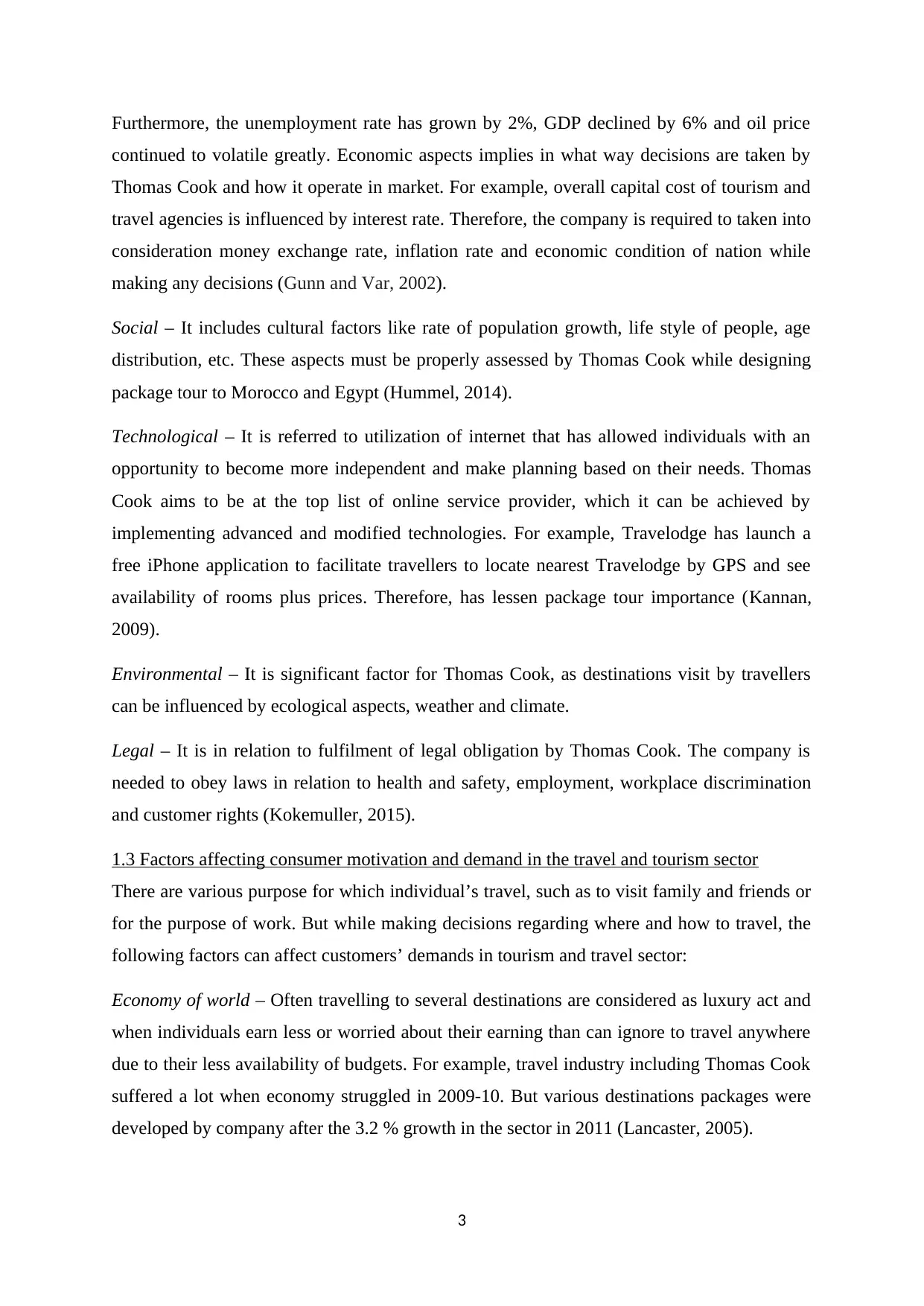
Furthermore, the unemployment rate has grown by 2%, GDP declined by 6% and oil price
continued to volatile greatly. Economic aspects implies in what way decisions are taken by
Thomas Cook and how it operate in market. For example, overall capital cost of tourism and
travel agencies is influenced by interest rate. Therefore, the company is required to taken into
consideration money exchange rate, inflation rate and economic condition of nation while
making any decisions (Gunn and Var, 2002).
Social – It includes cultural factors like rate of population growth, life style of people, age
distribution, etc. These aspects must be properly assessed by Thomas Cook while designing
package tour to Morocco and Egypt (Hummel, 2014).
Technological – It is referred to utilization of internet that has allowed individuals with an
opportunity to become more independent and make planning based on their needs. Thomas
Cook aims to be at the top list of online service provider, which it can be achieved by
implementing advanced and modified technologies. For example, Travelodge has launch a
free iPhone application to facilitate travellers to locate nearest Travelodge by GPS and see
availability of rooms plus prices. Therefore, has lessen package tour importance (Kannan,
2009).
Environmental – It is significant factor for Thomas Cook, as destinations visit by travellers
can be influenced by ecological aspects, weather and climate.
Legal – It is in relation to fulfilment of legal obligation by Thomas Cook. The company is
needed to obey laws in relation to health and safety, employment, workplace discrimination
and customer rights (Kokemuller, 2015).
1.3 Factors affecting consumer motivation and demand in the travel and tourism sector
There are various purpose for which individual’s travel, such as to visit family and friends or
for the purpose of work. But while making decisions regarding where and how to travel, the
following factors can affect customers’ demands in tourism and travel sector:
Economy of world – Often travelling to several destinations are considered as luxury act and
when individuals earn less or worried about their earning than can ignore to travel anywhere
due to their less availability of budgets. For example, travel industry including Thomas Cook
suffered a lot when economy struggled in 2009-10. But various destinations packages were
developed by company after the 3.2 % growth in the sector in 2011 (Lancaster, 2005).
3
continued to volatile greatly. Economic aspects implies in what way decisions are taken by
Thomas Cook and how it operate in market. For example, overall capital cost of tourism and
travel agencies is influenced by interest rate. Therefore, the company is required to taken into
consideration money exchange rate, inflation rate and economic condition of nation while
making any decisions (Gunn and Var, 2002).
Social – It includes cultural factors like rate of population growth, life style of people, age
distribution, etc. These aspects must be properly assessed by Thomas Cook while designing
package tour to Morocco and Egypt (Hummel, 2014).
Technological – It is referred to utilization of internet that has allowed individuals with an
opportunity to become more independent and make planning based on their needs. Thomas
Cook aims to be at the top list of online service provider, which it can be achieved by
implementing advanced and modified technologies. For example, Travelodge has launch a
free iPhone application to facilitate travellers to locate nearest Travelodge by GPS and see
availability of rooms plus prices. Therefore, has lessen package tour importance (Kannan,
2009).
Environmental – It is significant factor for Thomas Cook, as destinations visit by travellers
can be influenced by ecological aspects, weather and climate.
Legal – It is in relation to fulfilment of legal obligation by Thomas Cook. The company is
needed to obey laws in relation to health and safety, employment, workplace discrimination
and customer rights (Kokemuller, 2015).
1.3 Factors affecting consumer motivation and demand in the travel and tourism sector
There are various purpose for which individual’s travel, such as to visit family and friends or
for the purpose of work. But while making decisions regarding where and how to travel, the
following factors can affect customers’ demands in tourism and travel sector:
Economy of world – Often travelling to several destinations are considered as luxury act and
when individuals earn less or worried about their earning than can ignore to travel anywhere
due to their less availability of budgets. For example, travel industry including Thomas Cook
suffered a lot when economy struggled in 2009-10. But various destinations packages were
developed by company after the 3.2 % growth in the sector in 2011 (Lancaster, 2005).
3
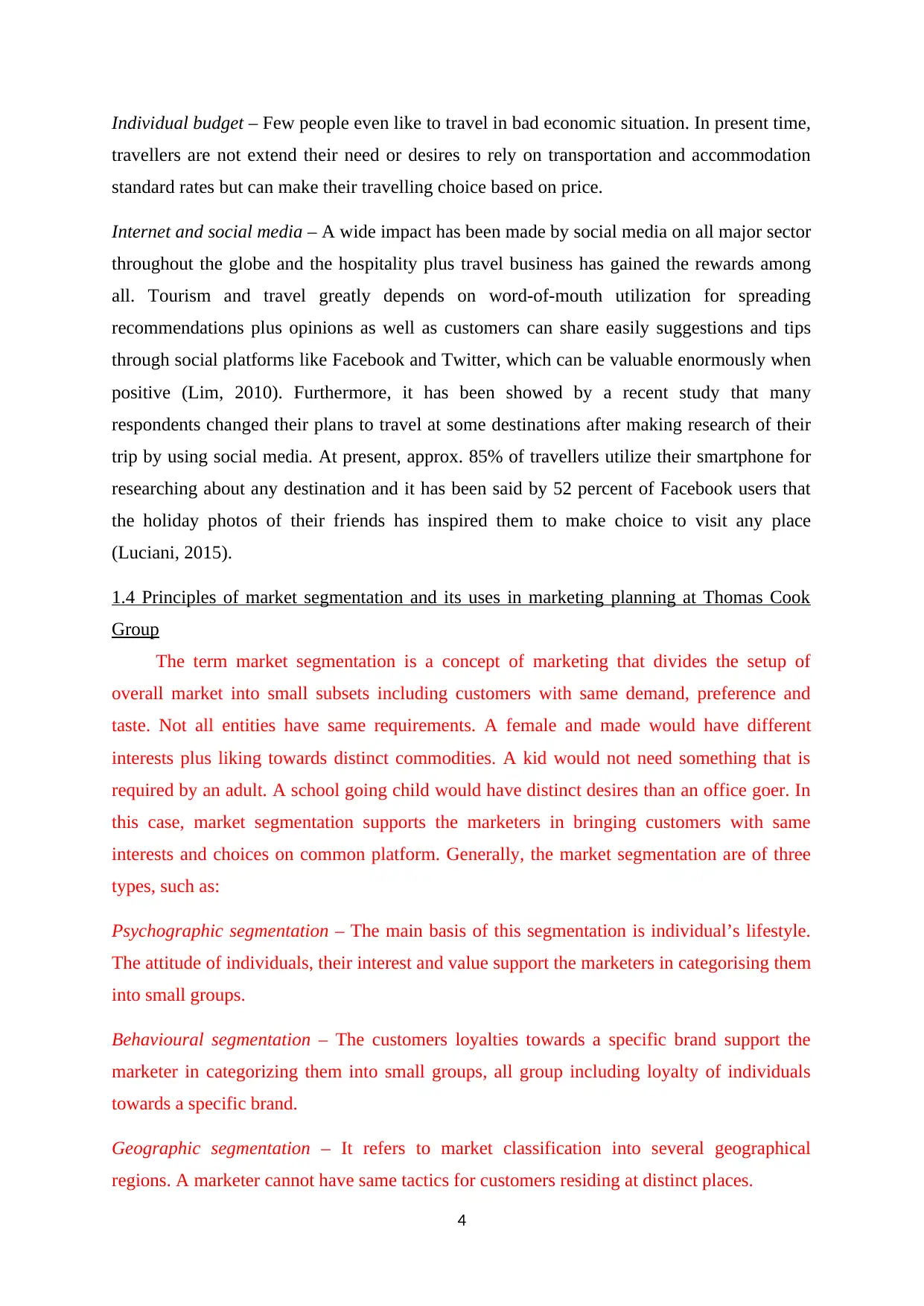
Individual budget – Few people even like to travel in bad economic situation. In present time,
travellers are not extend their need or desires to rely on transportation and accommodation
standard rates but can make their travelling choice based on price.
Internet and social media – A wide impact has been made by social media on all major sector
throughout the globe and the hospitality plus travel business has gained the rewards among
all. Tourism and travel greatly depends on word-of-mouth utilization for spreading
recommendations plus opinions as well as customers can share easily suggestions and tips
through social platforms like Facebook and Twitter, which can be valuable enormously when
positive (Lim, 2010). Furthermore, it has been showed by a recent study that many
respondents changed their plans to travel at some destinations after making research of their
trip by using social media. At present, approx. 85% of travellers utilize their smartphone for
researching about any destination and it has been said by 52 percent of Facebook users that
the holiday photos of their friends has inspired them to make choice to visit any place
(Luciani, 2015).
1.4 Principles of market segmentation and its uses in marketing planning at Thomas Cook
Group
The term market segmentation is a concept of marketing that divides the setup of
overall market into small subsets including customers with same demand, preference and
taste. Not all entities have same requirements. A female and made would have different
interests plus liking towards distinct commodities. A kid would not need something that is
required by an adult. A school going child would have distinct desires than an office goer. In
this case, market segmentation supports the marketers in bringing customers with same
interests and choices on common platform. Generally, the market segmentation are of three
types, such as:
Psychographic segmentation – The main basis of this segmentation is individual’s lifestyle.
The attitude of individuals, their interest and value support the marketers in categorising them
into small groups.
Behavioural segmentation – The customers loyalties towards a specific brand support the
marketer in categorizing them into small groups, all group including loyalty of individuals
towards a specific brand.
Geographic segmentation – It refers to market classification into several geographical
regions. A marketer cannot have same tactics for customers residing at distinct places.
4
travellers are not extend their need or desires to rely on transportation and accommodation
standard rates but can make their travelling choice based on price.
Internet and social media – A wide impact has been made by social media on all major sector
throughout the globe and the hospitality plus travel business has gained the rewards among
all. Tourism and travel greatly depends on word-of-mouth utilization for spreading
recommendations plus opinions as well as customers can share easily suggestions and tips
through social platforms like Facebook and Twitter, which can be valuable enormously when
positive (Lim, 2010). Furthermore, it has been showed by a recent study that many
respondents changed their plans to travel at some destinations after making research of their
trip by using social media. At present, approx. 85% of travellers utilize their smartphone for
researching about any destination and it has been said by 52 percent of Facebook users that
the holiday photos of their friends has inspired them to make choice to visit any place
(Luciani, 2015).
1.4 Principles of market segmentation and its uses in marketing planning at Thomas Cook
Group
The term market segmentation is a concept of marketing that divides the setup of
overall market into small subsets including customers with same demand, preference and
taste. Not all entities have same requirements. A female and made would have different
interests plus liking towards distinct commodities. A kid would not need something that is
required by an adult. A school going child would have distinct desires than an office goer. In
this case, market segmentation supports the marketers in bringing customers with same
interests and choices on common platform. Generally, the market segmentation are of three
types, such as:
Psychographic segmentation – The main basis of this segmentation is individual’s lifestyle.
The attitude of individuals, their interest and value support the marketers in categorising them
into small groups.
Behavioural segmentation – The customers loyalties towards a specific brand support the
marketer in categorizing them into small groups, all group including loyalty of individuals
towards a specific brand.
Geographic segmentation – It refers to market classification into several geographical
regions. A marketer cannot have same tactics for customers residing at distinct places.
4
⊘ This is a preview!⊘
Do you want full access?
Subscribe today to unlock all pages.

Trusted by 1+ million students worldwide
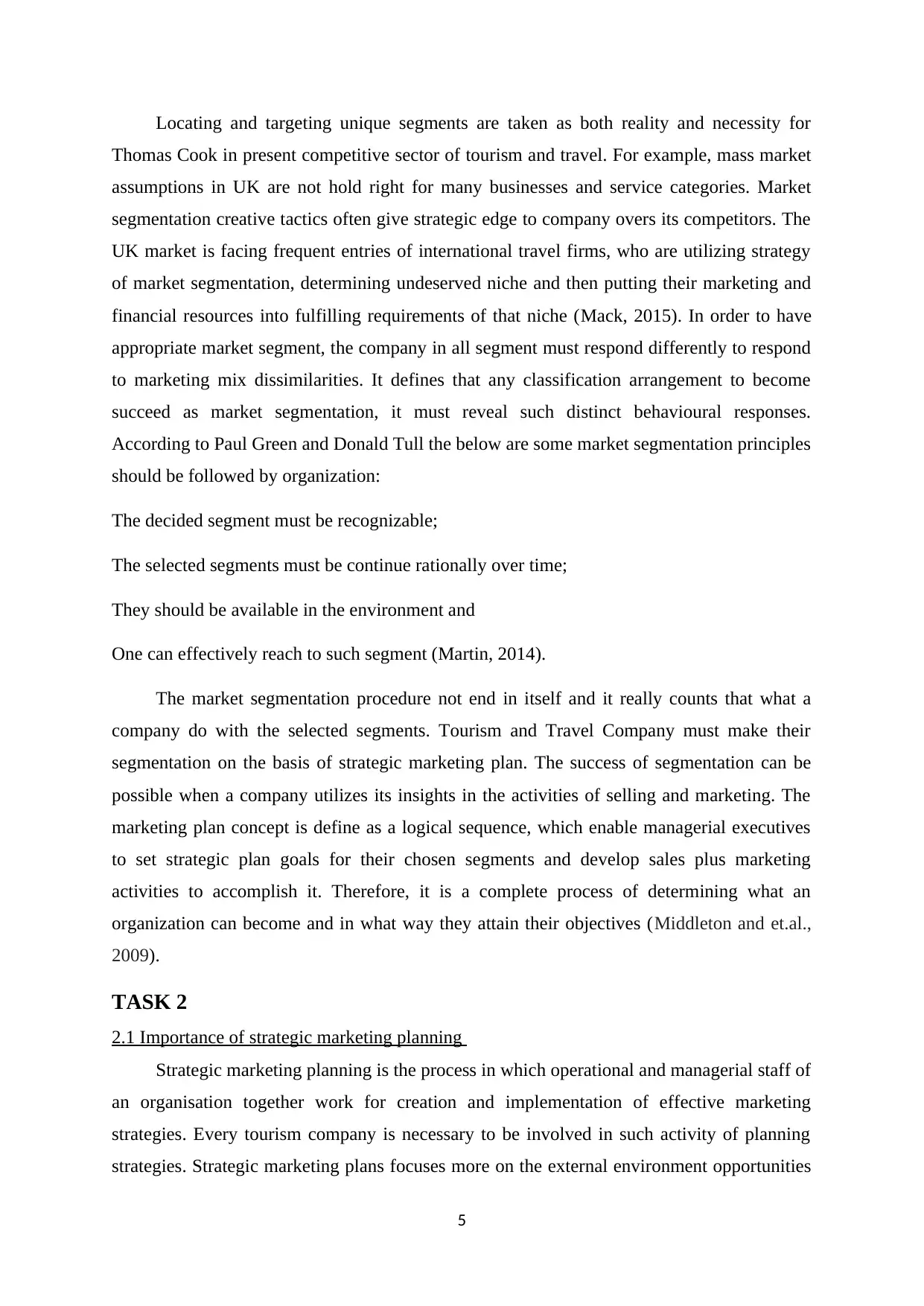
Locating and targeting unique segments are taken as both reality and necessity for
Thomas Cook in present competitive sector of tourism and travel. For example, mass market
assumptions in UK are not hold right for many businesses and service categories. Market
segmentation creative tactics often give strategic edge to company overs its competitors. The
UK market is facing frequent entries of international travel firms, who are utilizing strategy
of market segmentation, determining undeserved niche and then putting their marketing and
financial resources into fulfilling requirements of that niche (Mack, 2015). In order to have
appropriate market segment, the company in all segment must respond differently to respond
to marketing mix dissimilarities. It defines that any classification arrangement to become
succeed as market segmentation, it must reveal such distinct behavioural responses.
According to Paul Green and Donald Tull the below are some market segmentation principles
should be followed by organization:
The decided segment must be recognizable;
The selected segments must be continue rationally over time;
They should be available in the environment and
One can effectively reach to such segment (Martin, 2014).
The market segmentation procedure not end in itself and it really counts that what a
company do with the selected segments. Tourism and Travel Company must make their
segmentation on the basis of strategic marketing plan. The success of segmentation can be
possible when a company utilizes its insights in the activities of selling and marketing. The
marketing plan concept is define as a logical sequence, which enable managerial executives
to set strategic plan goals for their chosen segments and develop sales plus marketing
activities to accomplish it. Therefore, it is a complete process of determining what an
organization can become and in what way they attain their objectives (Middleton and et.al.,
2009).
TASK 2
2.1 Importance of strategic marketing planning
Strategic marketing planning is the process in which operational and managerial staff of
an organisation together work for creation and implementation of effective marketing
strategies. Every tourism company is necessary to be involved in such activity of planning
strategies. Strategic marketing plans focuses more on the external environment opportunities
5
Thomas Cook in present competitive sector of tourism and travel. For example, mass market
assumptions in UK are not hold right for many businesses and service categories. Market
segmentation creative tactics often give strategic edge to company overs its competitors. The
UK market is facing frequent entries of international travel firms, who are utilizing strategy
of market segmentation, determining undeserved niche and then putting their marketing and
financial resources into fulfilling requirements of that niche (Mack, 2015). In order to have
appropriate market segment, the company in all segment must respond differently to respond
to marketing mix dissimilarities. It defines that any classification arrangement to become
succeed as market segmentation, it must reveal such distinct behavioural responses.
According to Paul Green and Donald Tull the below are some market segmentation principles
should be followed by organization:
The decided segment must be recognizable;
The selected segments must be continue rationally over time;
They should be available in the environment and
One can effectively reach to such segment (Martin, 2014).
The market segmentation procedure not end in itself and it really counts that what a
company do with the selected segments. Tourism and Travel Company must make their
segmentation on the basis of strategic marketing plan. The success of segmentation can be
possible when a company utilizes its insights in the activities of selling and marketing. The
marketing plan concept is define as a logical sequence, which enable managerial executives
to set strategic plan goals for their chosen segments and develop sales plus marketing
activities to accomplish it. Therefore, it is a complete process of determining what an
organization can become and in what way they attain their objectives (Middleton and et.al.,
2009).
TASK 2
2.1 Importance of strategic marketing planning
Strategic marketing planning is the process in which operational and managerial staff of
an organisation together work for creation and implementation of effective marketing
strategies. Every tourism company is necessary to be involved in such activity of planning
strategies. Strategic marketing plans focuses more on the external environment opportunities
5
Paraphrase This Document
Need a fresh take? Get an instant paraphrase of this document with our AI Paraphraser
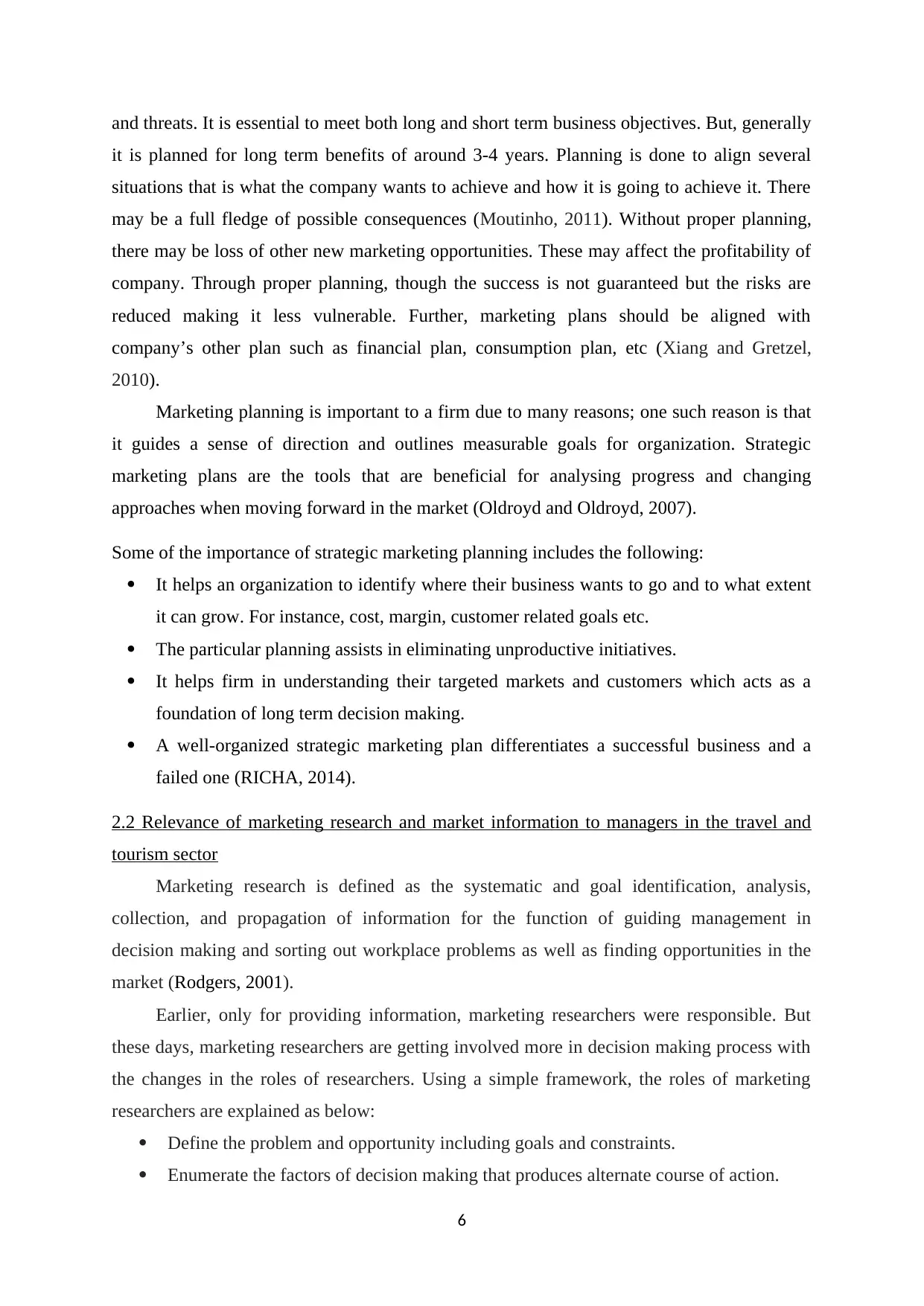
and threats. It is essential to meet both long and short term business objectives. But, generally
it is planned for long term benefits of around 3-4 years. Planning is done to align several
situations that is what the company wants to achieve and how it is going to achieve it. There
may be a full fledge of possible consequences (Moutinho, 2011). Without proper planning,
there may be loss of other new marketing opportunities. These may affect the profitability of
company. Through proper planning, though the success is not guaranteed but the risks are
reduced making it less vulnerable. Further, marketing plans should be aligned with
company’s other plan such as financial plan, consumption plan, etc (Xiang and Gretzel,
2010).
Marketing planning is important to a firm due to many reasons; one such reason is that
it guides a sense of direction and outlines measurable goals for organization. Strategic
marketing plans are the tools that are beneficial for analysing progress and changing
approaches when moving forward in the market (Oldroyd and Oldroyd, 2007).
Some of the importance of strategic marketing planning includes the following:
It helps an organization to identify where their business wants to go and to what extent
it can grow. For instance, cost, margin, customer related goals etc.
The particular planning assists in eliminating unproductive initiatives.
It helps firm in understanding their targeted markets and customers which acts as a
foundation of long term decision making.
A well-organized strategic marketing plan differentiates a successful business and a
failed one (RICHA, 2014).
2.2 Relevance of marketing research and market information to managers in the travel and
tourism sector
Marketing research is defined as the systematic and goal identification, analysis,
collection, and propagation of information for the function of guiding management in
decision making and sorting out workplace problems as well as finding opportunities in the
market (Rodgers, 2001).
Earlier, only for providing information, marketing researchers were responsible. But
these days, marketing researchers are getting involved more in decision making process with
the changes in the roles of researchers. Using a simple framework, the roles of marketing
researchers are explained as below:
Define the problem and opportunity including goals and constraints.
Enumerate the factors of decision making that produces alternate course of action.
6
it is planned for long term benefits of around 3-4 years. Planning is done to align several
situations that is what the company wants to achieve and how it is going to achieve it. There
may be a full fledge of possible consequences (Moutinho, 2011). Without proper planning,
there may be loss of other new marketing opportunities. These may affect the profitability of
company. Through proper planning, though the success is not guaranteed but the risks are
reduced making it less vulnerable. Further, marketing plans should be aligned with
company’s other plan such as financial plan, consumption plan, etc (Xiang and Gretzel,
2010).
Marketing planning is important to a firm due to many reasons; one such reason is that
it guides a sense of direction and outlines measurable goals for organization. Strategic
marketing plans are the tools that are beneficial for analysing progress and changing
approaches when moving forward in the market (Oldroyd and Oldroyd, 2007).
Some of the importance of strategic marketing planning includes the following:
It helps an organization to identify where their business wants to go and to what extent
it can grow. For instance, cost, margin, customer related goals etc.
The particular planning assists in eliminating unproductive initiatives.
It helps firm in understanding their targeted markets and customers which acts as a
foundation of long term decision making.
A well-organized strategic marketing plan differentiates a successful business and a
failed one (RICHA, 2014).
2.2 Relevance of marketing research and market information to managers in the travel and
tourism sector
Marketing research is defined as the systematic and goal identification, analysis,
collection, and propagation of information for the function of guiding management in
decision making and sorting out workplace problems as well as finding opportunities in the
market (Rodgers, 2001).
Earlier, only for providing information, marketing researchers were responsible. But
these days, marketing researchers are getting involved more in decision making process with
the changes in the roles of researchers. Using a simple framework, the roles of marketing
researchers are explained as below:
Define the problem and opportunity including goals and constraints.
Enumerate the factors of decision making that produces alternate course of action.
6
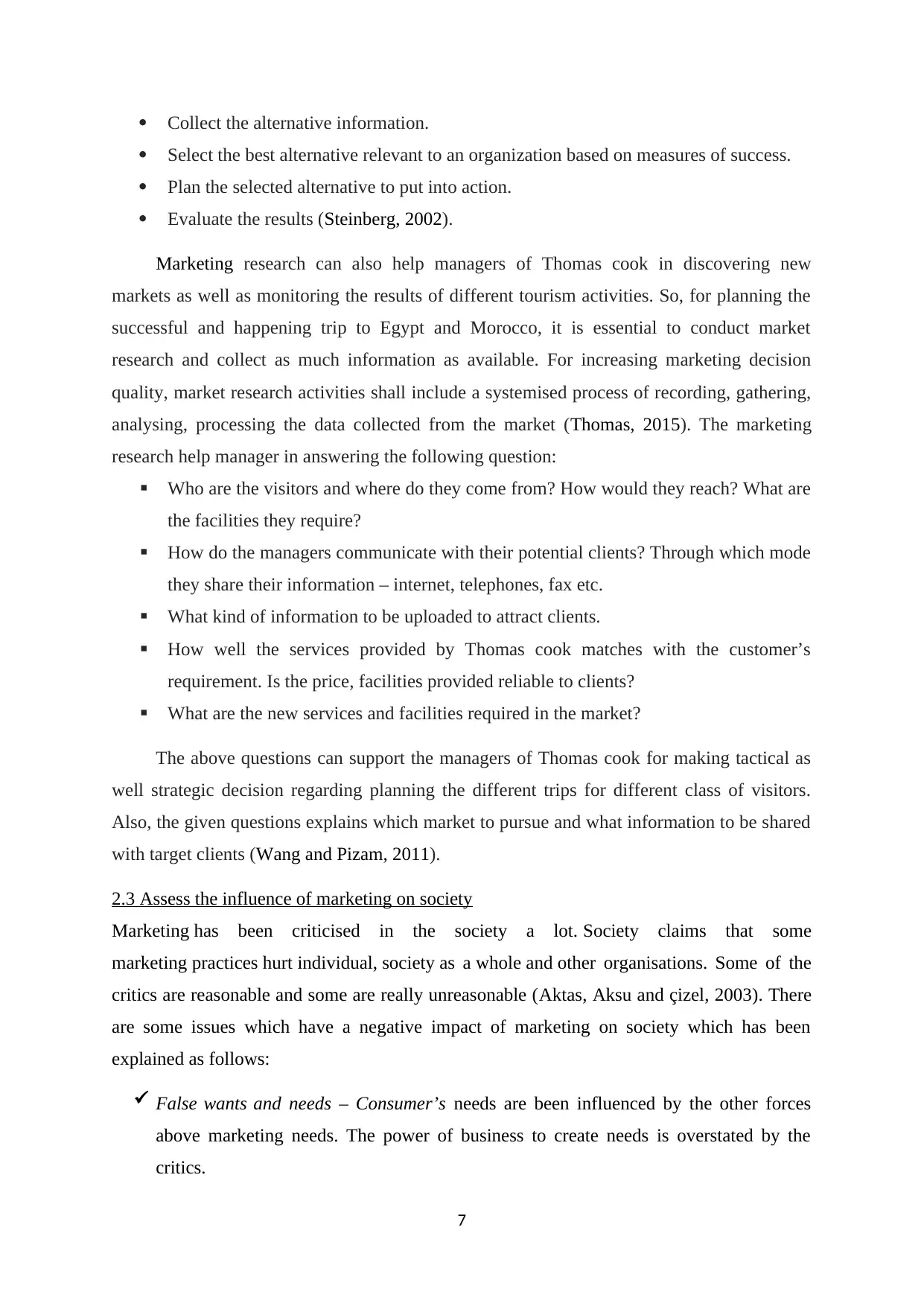
Collect the alternative information.
Select the best alternative relevant to an organization based on measures of success.
Plan the selected alternative to put into action.
Evaluate the results (Steinberg, 2002).
Marketing research can also help managers of Thomas cook in discovering new
markets as well as monitoring the results of different tourism activities. So, for planning the
successful and happening trip to Egypt and Morocco, it is essential to conduct market
research and collect as much information as available. For increasing marketing decision
quality, market research activities shall include a systemised process of recording, gathering,
analysing, processing the data collected from the market (Thomas, 2015). The marketing
research help manager in answering the following question:
Who are the visitors and where do they come from? How would they reach? What are
the facilities they require?
How do the managers communicate with their potential clients? Through which mode
they share their information – internet, telephones, fax etc.
What kind of information to be uploaded to attract clients.
How well the services provided by Thomas cook matches with the customer’s
requirement. Is the price, facilities provided reliable to clients?
What are the new services and facilities required in the market?
The above questions can support the managers of Thomas cook for making tactical as
well strategic decision regarding planning the different trips for different class of visitors.
Also, the given questions explains which market to pursue and what information to be shared
with target clients (Wang and Pizam, 2011).
2.3 Assess the influence of marketing on society
Marketing has been criticised in the society a lot. Society claims that some
marketing practices hurt individual, society as a whole and other organisations. Some of the
critics are reasonable and some are really unreasonable (Aktas, Aksu and çizel, 2003). There
are some issues which have a negative impact of marketing on society which has been
explained as follows:
False wants and needs – Consumer’s needs are been influenced by the other forces
above marketing needs. The power of business to create needs is overstated by the
critics.
7
Select the best alternative relevant to an organization based on measures of success.
Plan the selected alternative to put into action.
Evaluate the results (Steinberg, 2002).
Marketing research can also help managers of Thomas cook in discovering new
markets as well as monitoring the results of different tourism activities. So, for planning the
successful and happening trip to Egypt and Morocco, it is essential to conduct market
research and collect as much information as available. For increasing marketing decision
quality, market research activities shall include a systemised process of recording, gathering,
analysing, processing the data collected from the market (Thomas, 2015). The marketing
research help manager in answering the following question:
Who are the visitors and where do they come from? How would they reach? What are
the facilities they require?
How do the managers communicate with their potential clients? Through which mode
they share their information – internet, telephones, fax etc.
What kind of information to be uploaded to attract clients.
How well the services provided by Thomas cook matches with the customer’s
requirement. Is the price, facilities provided reliable to clients?
What are the new services and facilities required in the market?
The above questions can support the managers of Thomas cook for making tactical as
well strategic decision regarding planning the different trips for different class of visitors.
Also, the given questions explains which market to pursue and what information to be shared
with target clients (Wang and Pizam, 2011).
2.3 Assess the influence of marketing on society
Marketing has been criticised in the society a lot. Society claims that some
marketing practices hurt individual, society as a whole and other organisations. Some of the
critics are reasonable and some are really unreasonable (Aktas, Aksu and çizel, 2003). There
are some issues which have a negative impact of marketing on society which has been
explained as follows:
False wants and needs – Consumer’s needs are been influenced by the other forces
above marketing needs. The power of business to create needs is overstated by the
critics.
7
⊘ This is a preview!⊘
Do you want full access?
Subscribe today to unlock all pages.

Trusted by 1+ million students worldwide
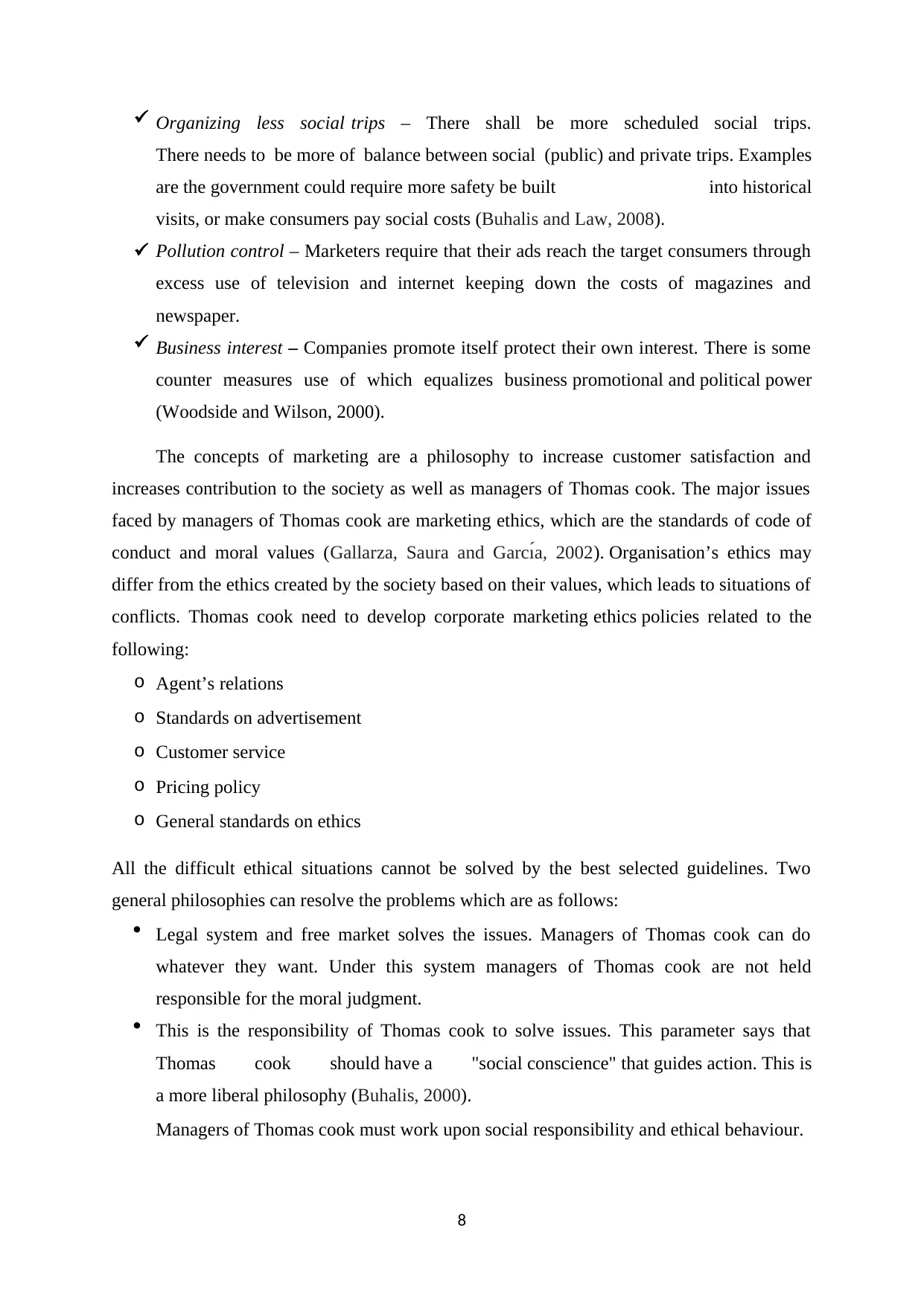
Organizing less social trips – There shall be more scheduled social trips.
There needs to be more of balance between social (public) and private trips. Examples
are the government could require more safety be built into historical
visits, or make consumers pay social costs (Buhalis and Law, 2008).
Pollution control – Marketers require that their ads reach the target consumers through
excess use of television and internet keeping down the costs of magazines and
newspaper.
Business interest – Companies promote itself protect their own interest. There is some
counter measures use of which equalizes business promotional and political power
(Woodside and Wilson, 2000).
The concepts of marketing are a philosophy to increase customer satisfaction and
increases contribution to the society as well as managers of Thomas cook. The major issues
faced by managers of Thomas cook are marketing ethics, which are the standards of code of
conduct and moral values (Gallarza, Saura and Garcı́a, 2002). Organisation’s ethics may
differ from the ethics created by the society based on their values, which leads to situations of
conflicts. Thomas cook need to develop corporate marketing ethics policies related to the
following:
o Agent’s relations
o Standards on advertisement
o Customer service
o Pricing policy
o General standards on ethics
All the difficult ethical situations cannot be solved by the best selected guidelines. Two
general philosophies can resolve the problems which are as follows:
Legal system and free market solves the issues. Managers of Thomas cook can do
whatever they want. Under this system managers of Thomas cook are not held
responsible for the moral judgment.
This is the responsibility of Thomas cook to solve issues. This parameter says that
Thomas cook should have a "social conscience" that guides action. This is
a more liberal philosophy (Buhalis, 2000).
Managers of Thomas cook must work upon social responsibility and ethical behaviour.
8
There needs to be more of balance between social (public) and private trips. Examples
are the government could require more safety be built into historical
visits, or make consumers pay social costs (Buhalis and Law, 2008).
Pollution control – Marketers require that their ads reach the target consumers through
excess use of television and internet keeping down the costs of magazines and
newspaper.
Business interest – Companies promote itself protect their own interest. There is some
counter measures use of which equalizes business promotional and political power
(Woodside and Wilson, 2000).
The concepts of marketing are a philosophy to increase customer satisfaction and
increases contribution to the society as well as managers of Thomas cook. The major issues
faced by managers of Thomas cook are marketing ethics, which are the standards of code of
conduct and moral values (Gallarza, Saura and Garcı́a, 2002). Organisation’s ethics may
differ from the ethics created by the society based on their values, which leads to situations of
conflicts. Thomas cook need to develop corporate marketing ethics policies related to the
following:
o Agent’s relations
o Standards on advertisement
o Customer service
o Pricing policy
o General standards on ethics
All the difficult ethical situations cannot be solved by the best selected guidelines. Two
general philosophies can resolve the problems which are as follows:
Legal system and free market solves the issues. Managers of Thomas cook can do
whatever they want. Under this system managers of Thomas cook are not held
responsible for the moral judgment.
This is the responsibility of Thomas cook to solve issues. This parameter says that
Thomas cook should have a "social conscience" that guides action. This is
a more liberal philosophy (Buhalis, 2000).
Managers of Thomas cook must work upon social responsibility and ethical behaviour.
8
Paraphrase This Document
Need a fresh take? Get an instant paraphrase of this document with our AI Paraphraser
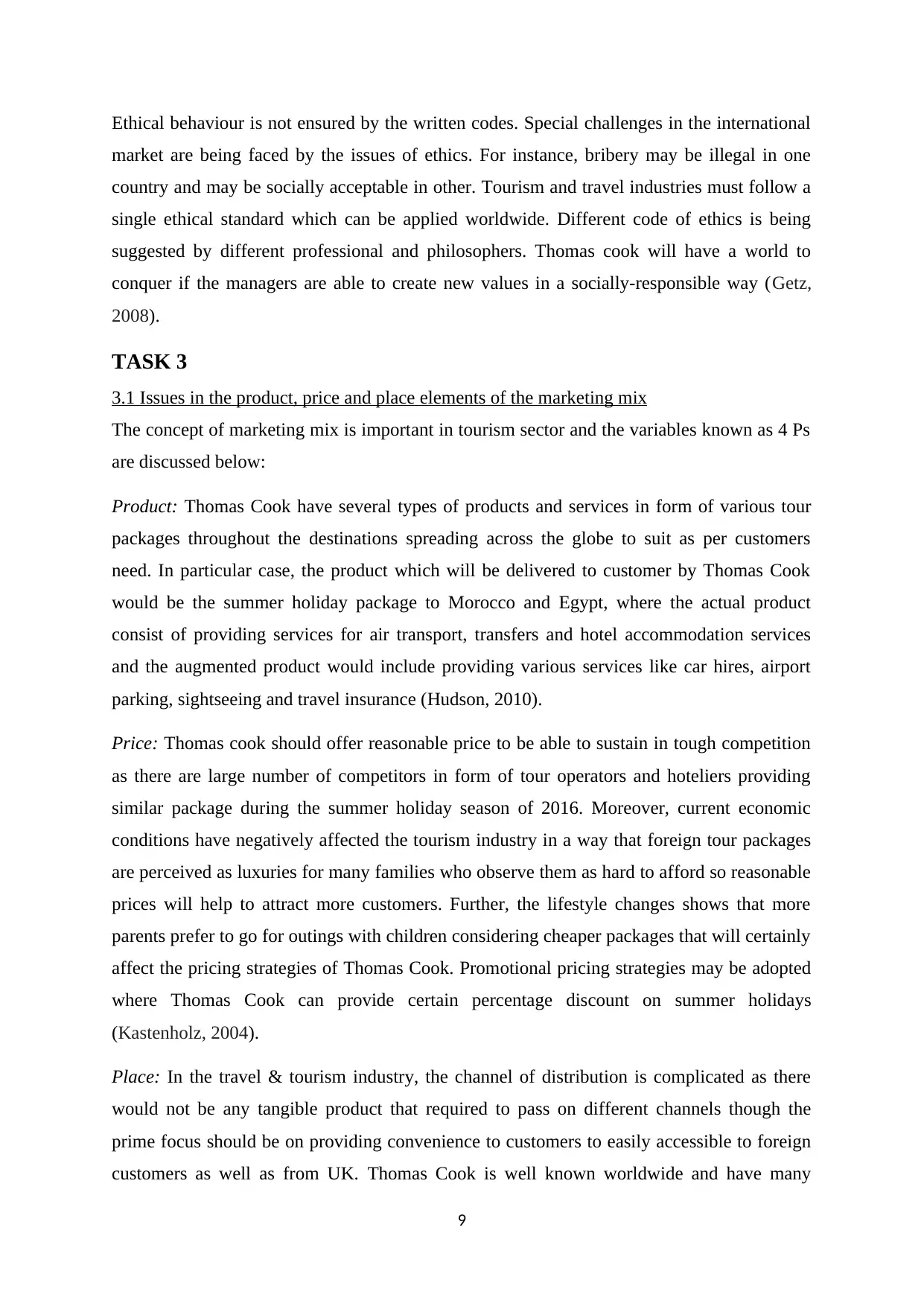
Ethical behaviour is not ensured by the written codes. Special challenges in the international
market are being faced by the issues of ethics. For instance, bribery may be illegal in one
country and may be socially acceptable in other. Tourism and travel industries must follow a
single ethical standard which can be applied worldwide. Different code of ethics is being
suggested by different professional and philosophers. Thomas cook will have a world to
conquer if the managers are able to create new values in a socially-responsible way (Getz,
2008).
TASK 3
3.1 Issues in the product, price and place elements of the marketing mix
The concept of marketing mix is important in tourism sector and the variables known as 4 Ps
are discussed below:
Product: Thomas Cook have several types of products and services in form of various tour
packages throughout the destinations spreading across the globe to suit as per customers
need. In particular case, the product which will be delivered to customer by Thomas Cook
would be the summer holiday package to Morocco and Egypt, where the actual product
consist of providing services for air transport, transfers and hotel accommodation services
and the augmented product would include providing various services like car hires, airport
parking, sightseeing and travel insurance (Hudson, 2010).
Price: Thomas cook should offer reasonable price to be able to sustain in tough competition
as there are large number of competitors in form of tour operators and hoteliers providing
similar package during the summer holiday season of 2016. Moreover, current economic
conditions have negatively affected the tourism industry in a way that foreign tour packages
are perceived as luxuries for many families who observe them as hard to afford so reasonable
prices will help to attract more customers. Further, the lifestyle changes shows that more
parents prefer to go for outings with children considering cheaper packages that will certainly
affect the pricing strategies of Thomas Cook. Promotional pricing strategies may be adopted
where Thomas Cook can provide certain percentage discount on summer holidays
(Kastenholz, 2004).
Place: In the travel & tourism industry, the channel of distribution is complicated as there
would not be any tangible product that required to pass on different channels though the
prime focus should be on providing convenience to customers to easily accessible to foreign
customers as well as from UK. Thomas Cook is well known worldwide and have many
9
market are being faced by the issues of ethics. For instance, bribery may be illegal in one
country and may be socially acceptable in other. Tourism and travel industries must follow a
single ethical standard which can be applied worldwide. Different code of ethics is being
suggested by different professional and philosophers. Thomas cook will have a world to
conquer if the managers are able to create new values in a socially-responsible way (Getz,
2008).
TASK 3
3.1 Issues in the product, price and place elements of the marketing mix
The concept of marketing mix is important in tourism sector and the variables known as 4 Ps
are discussed below:
Product: Thomas Cook have several types of products and services in form of various tour
packages throughout the destinations spreading across the globe to suit as per customers
need. In particular case, the product which will be delivered to customer by Thomas Cook
would be the summer holiday package to Morocco and Egypt, where the actual product
consist of providing services for air transport, transfers and hotel accommodation services
and the augmented product would include providing various services like car hires, airport
parking, sightseeing and travel insurance (Hudson, 2010).
Price: Thomas cook should offer reasonable price to be able to sustain in tough competition
as there are large number of competitors in form of tour operators and hoteliers providing
similar package during the summer holiday season of 2016. Moreover, current economic
conditions have negatively affected the tourism industry in a way that foreign tour packages
are perceived as luxuries for many families who observe them as hard to afford so reasonable
prices will help to attract more customers. Further, the lifestyle changes shows that more
parents prefer to go for outings with children considering cheaper packages that will certainly
affect the pricing strategies of Thomas Cook. Promotional pricing strategies may be adopted
where Thomas Cook can provide certain percentage discount on summer holidays
(Kastenholz, 2004).
Place: In the travel & tourism industry, the channel of distribution is complicated as there
would not be any tangible product that required to pass on different channels though the
prime focus should be on providing convenience to customers to easily accessible to foreign
customers as well as from UK. Thomas Cook is well known worldwide and have many
9
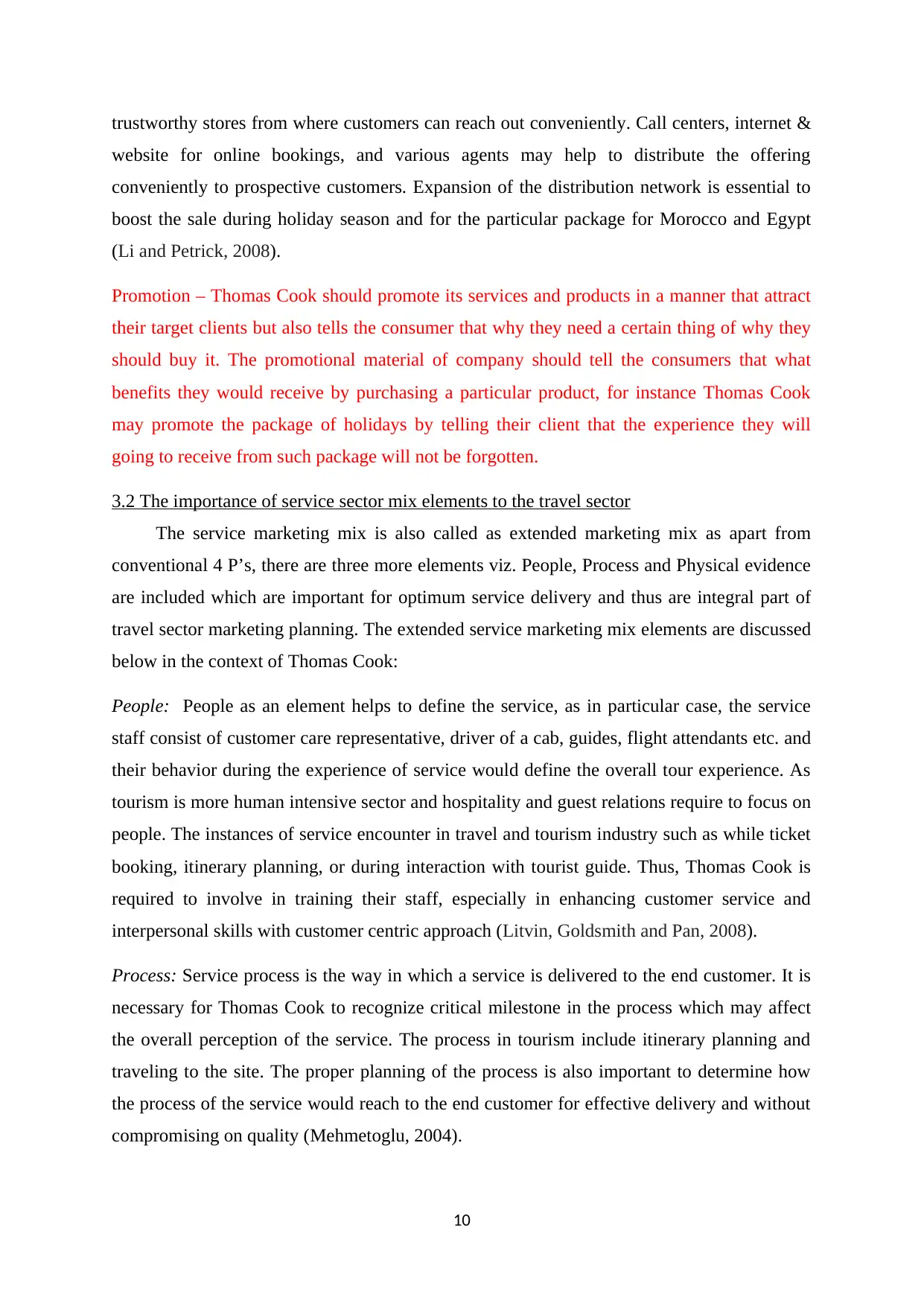
trustworthy stores from where customers can reach out conveniently. Call centers, internet &
website for online bookings, and various agents may help to distribute the offering
conveniently to prospective customers. Expansion of the distribution network is essential to
boost the sale during holiday season and for the particular package for Morocco and Egypt
(Li and Petrick, 2008).
Promotion – Thomas Cook should promote its services and products in a manner that attract
their target clients but also tells the consumer that why they need a certain thing of why they
should buy it. The promotional material of company should tell the consumers that what
benefits they would receive by purchasing a particular product, for instance Thomas Cook
may promote the package of holidays by telling their client that the experience they will
going to receive from such package will not be forgotten.
3.2 The importance of service sector mix elements to the travel sector
The service marketing mix is also called as extended marketing mix as apart from
conventional 4 P’s, there are three more elements viz. People, Process and Physical evidence
are included which are important for optimum service delivery and thus are integral part of
travel sector marketing planning. The extended service marketing mix elements are discussed
below in the context of Thomas Cook:
People: People as an element helps to define the service, as in particular case, the service
staff consist of customer care representative, driver of a cab, guides, flight attendants etc. and
their behavior during the experience of service would define the overall tour experience. As
tourism is more human intensive sector and hospitality and guest relations require to focus on
people. The instances of service encounter in travel and tourism industry such as while ticket
booking, itinerary planning, or during interaction with tourist guide. Thus, Thomas Cook is
required to involve in training their staff, especially in enhancing customer service and
interpersonal skills with customer centric approach (Litvin, Goldsmith and Pan, 2008).
Process: Service process is the way in which a service is delivered to the end customer. It is
necessary for Thomas Cook to recognize critical milestone in the process which may affect
the overall perception of the service. The process in tourism include itinerary planning and
traveling to the site. The proper planning of the process is also important to determine how
the process of the service would reach to the end customer for effective delivery and without
compromising on quality (Mehmetoglu, 2004).
10
website for online bookings, and various agents may help to distribute the offering
conveniently to prospective customers. Expansion of the distribution network is essential to
boost the sale during holiday season and for the particular package for Morocco and Egypt
(Li and Petrick, 2008).
Promotion – Thomas Cook should promote its services and products in a manner that attract
their target clients but also tells the consumer that why they need a certain thing of why they
should buy it. The promotional material of company should tell the consumers that what
benefits they would receive by purchasing a particular product, for instance Thomas Cook
may promote the package of holidays by telling their client that the experience they will
going to receive from such package will not be forgotten.
3.2 The importance of service sector mix elements to the travel sector
The service marketing mix is also called as extended marketing mix as apart from
conventional 4 P’s, there are three more elements viz. People, Process and Physical evidence
are included which are important for optimum service delivery and thus are integral part of
travel sector marketing planning. The extended service marketing mix elements are discussed
below in the context of Thomas Cook:
People: People as an element helps to define the service, as in particular case, the service
staff consist of customer care representative, driver of a cab, guides, flight attendants etc. and
their behavior during the experience of service would define the overall tour experience. As
tourism is more human intensive sector and hospitality and guest relations require to focus on
people. The instances of service encounter in travel and tourism industry such as while ticket
booking, itinerary planning, or during interaction with tourist guide. Thus, Thomas Cook is
required to involve in training their staff, especially in enhancing customer service and
interpersonal skills with customer centric approach (Litvin, Goldsmith and Pan, 2008).
Process: Service process is the way in which a service is delivered to the end customer. It is
necessary for Thomas Cook to recognize critical milestone in the process which may affect
the overall perception of the service. The process in tourism include itinerary planning and
traveling to the site. The proper planning of the process is also important to determine how
the process of the service would reach to the end customer for effective delivery and without
compromising on quality (Mehmetoglu, 2004).
10
⊘ This is a preview!⊘
Do you want full access?
Subscribe today to unlock all pages.

Trusted by 1+ million students worldwide
1 out of 18
Related Documents
Your All-in-One AI-Powered Toolkit for Academic Success.
+13062052269
info@desklib.com
Available 24*7 on WhatsApp / Email
![[object Object]](/_next/static/media/star-bottom.7253800d.svg)
Unlock your academic potential
Copyright © 2020–2026 A2Z Services. All Rights Reserved. Developed and managed by ZUCOL.





